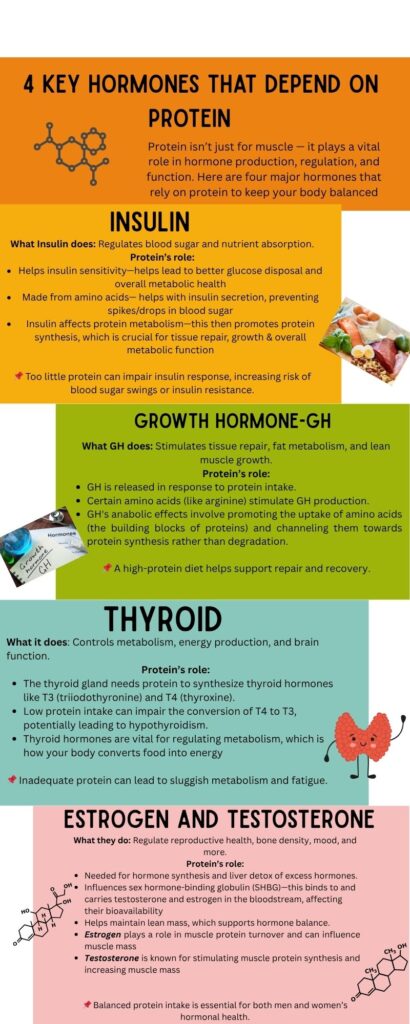For many women, life after 40 is a season of transformation — professionally, personally, and biologically. While most women are aware of the changes in estrogen and progesterone that come with perimenopause and menopause, few realize how much these hormonal shifts impact metabolism, muscle mass, and overall health.
One dietary factor plays a particularly powerful role in helping women maintain hormonal balance during this time: protein intake.
This article will explain why protein is critical for hormone regulation in women over 40, how much you need, and practical ways to incorporate it into your lifestyle.
Hormonal Changes After 40 — And Why Protein Matters
1. Declining Estrogen Levels
Estrogen begins to decline in the perimenopausal years, often starting in the late 30s or early 40s. This impacts not only reproductive health but also bone density, muscle mass, and metabolic rate. Research shows that reduced estrogen levels can lead to increased muscle protein breakdown and decreased muscle synthesis — making adequate protein intake more important than ever to preserve lean mass.
2. Fluctuating Progesterone
Progesterone levels also decrease, leading to potential sleep disturbances, mood swings, and increased stress hormone (cortisol) activity. Protein-rich meals help stabilize blood sugar, which in turn can blunt cortisol spikes and improve mood stability.
3. Insulin Sensitivity Changes
Aging and hormonal shifts reduce insulin sensitivity, meaning your body becomes less efficient at managing blood sugar. High-protein meals slow the absorption of carbohydrates, helping regulate blood sugar levels and prevent energy crashes.
Protein’s Role in Hormone Regulation
1. Building Blocks for Hormones
Proteins are made up of amino acids, which your body uses to produce certain hormones and neurotransmitters. For example, the amino acid tryptophan is a precursor to serotonin, which influences mood, sleep, and appetite.
2. Muscle Mass Preservation
Muscle tissue isn’t just for strength and appearance — it’s an active endocrine organ that releases myokines, signaling molecules that influence inflammation, metabolism, and hormone sensitivity. Without enough protein, age-related muscle loss (sarcopenia) accelerates, impacting hormone regulation.
3. Appetite and Satiety Control
Protein increases satiety hormones like peptide YY (PYY) and reduces hunger hormones like ghrelin. This balance can be particularly helpful during perimenopause, when appetite and cravings may increase due to fluctuating estrogen.
4. Blood Sugar Regulation
Consistent protein intake helps keep blood sugar steady, reducing the rollercoaster effect that worsens hot flashes, mood swings, and energy dips.

How Much Protein Do Women Over 40 Really Need?
The general Recommended Dietary Allowance (RDA) for protein is 0.8 grams per kilogram of body weight per day — but this is a minimum to prevent deficiency, not an optimal target for muscle maintenance and hormone health.
For women over 40, most research supports 1.2–1.6 grams per kilogram of body weight per day to maintain lean mass and metabolic health. For example:
- 150 lbs (68 kg) woman: Aim for 82–109 grams per day
- 170 lbs (77 kg) woman: Aim for 92–123 grams per day
Best Protein Sources for Hormone Health
Animal-Based:
- Lean poultry (chicken, turkey)
- Fish (salmon, sardines, tuna — also high in omega-3s for inflammation control)
- Eggs and egg whites
- Greek yogurt and cottage cheese
- Lean beef and pork
Plant-Based:
- Lentils, chickpeas, and black beans
- Tofu and tempeh
- Quinoa
- Edamame
- Nuts and seeds (also rich in healthy fats)
Practical Tips for Meeting Your Protein Goals
- Distribute Protein Throughout the Day
Aim for 20–35 grams of protein at each meal rather than loading it all at dinner. This improves muscle protein synthesis and blood sugar stability. - Start Your Day with Protein
Breakfast sets the tone for blood sugar control. Swap carb-heavy breakfasts for options like eggs, Greek yogurt, or a protein smoothie. - Use Protein Supplements Strategically
A high-quality protein powder can help fill gaps, especially post-workout or on busy days. - Pair Protein with Healthy Fats and Fiber
This trio supports steady blood sugar and prolonged satiety, further aiding hormonal balance. - Track Intake Initially
Use a food tracking app for a week to see where you stand. Many women underestimate their protein intake by 30–40%.
The Link Between Protein and Bone Health
Bone loss accelerates after menopause due to declining estrogen. While calcium and vitamin D are important, protein also plays a direct role in bone health by supporting collagen production and calcium metabolism. Higher protein diets are associated with greater bone density in postmenopausal women.
What Happens If You Don’t Get Enough Protein?
- Increased muscle loss and weakness (sarcopenia)
- More pronounced blood sugar swings
- Worsening hot flashes and night sweats due to poor blood sugar control
- Higher risk of weight gain due to increased fat mass
- Slower recovery from workouts or injuries
Putting It All Together
For women over 40, prioritizing protein isn’t just about fitness goals — it’s a foundational step in supporting hormone balance, metabolic health, bone strength, and overall quality of life. By aiming for 1.2–1.6 g/kg body weight daily, choosing high-quality protein sources, and spreading intake evenly across meals, you can help your body navigate the hormonal transitions of midlife with strength and resilience.
References:
- Phillips SM, et al. “Protein requirements and muscle mass/strength changes during intensive training in women.” Applied Physiology, Nutrition, and Metabolism. 2016.
- Mangano KM, et al. “Dietary protein is beneficial to bone health under conditions of adequate calcium intake: an update on clinical research.” Current Opinion in Clinical Nutrition & Metabolic Care. 2014.
- Leidy HJ, et al. “The role of protein in weight loss and maintenance.” American Journal of Clinical Nutrition. 2015.

Recent Comments